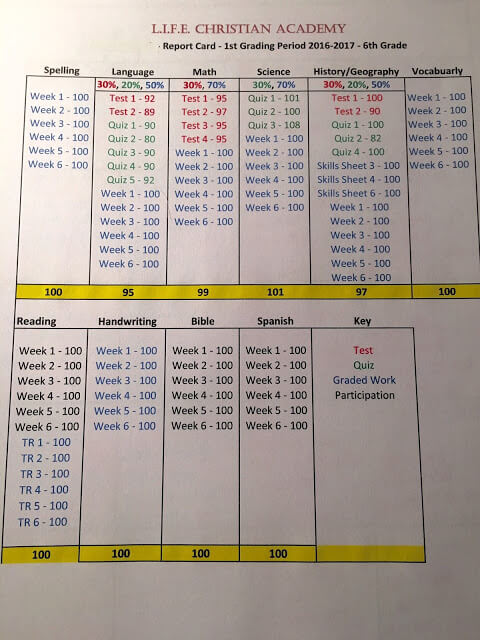Tests
Quizzes
Daily Graded Work
Participation (you could also call this completion grades) Here is a good example. When my son completes his daily math assignment, I grade it on the spot. I let him know which math problems were incorrect. I reteach or review any concepts right away while it is still fresh. Then he will re-do the math problem to make it correct. That is daily graded work and I consider it a 100. He completed the work, we addressed any issues, and he was able to grasp the concept and correct the work. All of this happens right away. Sometimes if I am working with one of the other kids, the work will be set aside for me to grade as soon as I can. However, we ALWAYS correct work and review any missed concepts on the same day. Now with quizzes and tests, those grades stand firm. They must make any necessary corrections but I do not change the original grade. This is just my way of prepping them for later in life (and college :)). I want them to understand the importance of studying and preparing for a test or quiz. Since I am able to address things on the spot, their grades are very high. Again, another perk to homeschooling. They basically have a personal tutor. Moi! :) On report cards, I will typically give a "weekly" grade. Instead of writing a 100 for every single assignment, this gives them the same grade but saves my sanity. We do have a couple of subjects that are really just experience at this point. For example, I added Spanish this year. All three kids are working on it but it is really just for exposure. So, instead of killing myself and them with Spanish quizzes and tests, everyone gets a participation grade. If they are actively, and diligently working on their lesson, they receive a 100. Again, this can be done with weekly grades. I do spot check them to make sure they are retaining their Spanish vocabulary but it is not grades. Again, if there is an issue, we fix it on the spot.
This is a picture of my youngest son's report card. He is in 3rd grade so I do not weight his grades. His grades are evenly averaged together for each subject. I noticed I did not have Vocabulary coded the correct color for this picture. It should be blue because it is graded work. I also give a report card to our first grader. Her's is very similar to this one except she does not have quite as many tests, etc.
This is the first year I added weight to my oldest son's grades. He is a sixth grader so I feel it is important for him to begin understanding the value of a weighted grade. I picked four subjects to weight this year: Language, Math, History, and Science. Now the weights were dependent on the curriculum. For example, Language has tests, quizzes, and daily graded work. But Math only has tests and daily graded work. I adjusted the weights according to the specifics of each subject. Here are two examples: Language - We are using ABeka which offers tests, quizzes, and daily work
- Tests 30% (it is important to make sure you have more than one test on the report card, otherwise that one test would be 30% of the entire average - same goes for the other categories)
- Quizzes 20%
- Daily Graded Work 50%
Math - We are using Saxon Math and only using the tests and daily lessons. I could increase the weight of the tests but since this is his first year with weighted grades I decided to stick with 30%.
- Tests 30%
- Daily Graded Work 70%
This is my oldest son's report card. He is a 6th grader, therefore, he has four subjects with weighted grades. I have listed the weights (at the top) in correspondence to the Key and color coding of each category.
So, there you have it. I am always impressed at how excited the kids get for their report cards. Also, we make it a big deal to show Daddy. He also really takes the time to look over each subject and grade.
For some this system would seem like the biggest headache. For our family, it works and it works really well. :)
\


No comments:
Post a Comment